- Home
- Rosamunde Pilcher
The Day of the Storm Page 14
The Day of the Storm Read online
Page 14
It was all charming, and just what I had imagined, and somehow wrong. A kitchen like an advertisement, a dining room furnished with gleaming mahogany, upstairs there were four bedrooms and three bathrooms, a sewing room and a linen cupboard of mammoth proportions, richly smelling of soap.
At the back of the house was a little patio, and then a long garden sloped up to a distant hedge. I looked at the patio and could see Mollie out there, entertaining her friends, with cane furniture set out on the flagstones, and martinis to drink, served from an expensive glass trolley.
I said, “It’s a perfect house,” and meant it. But I did not love it as I loved Boscarva. Perhaps because it was too perfect.
We stood in the elegant out-of-place drawing room and eyed each other. Our day together seemed to have come to an end. Perhaps Eliot felt this too and wanted to postpone it, for he said, “I could put on a kettle and make you a cup of tea, only I know that there’s no milk in the fridge.”
“I think we should go home.” I was surprised by an enormous yawn, and Eliot laughed at me. He took my shoulders between his hands. “You’re sleepy.”
“Too much fresh air,” I answered. “Too much wine.”
I tipped my head back to look up into his face, and we were very close. I could feel his fingers tighten over my shoulders. He wasn’t laughing any more, but his deep-set eyes held an expression as gentle as anything I had ever seen.
I said, “It’s been a wonderful day…” but that was as far as I got, because he kissed me then, and for some time I was not able to say anything at all. When at last he drew away I was so shaken that all I could do was lean limply against him, wanting to cry, feeling a fool, knowing that the situation was fast slipping out of my control. My cheek was against his coat, and his arms around me held me so close that I could feel, like the throb of a drum, the solid beating of his heart.
Over the top of my head, I heard him say, “You mustn’t go back to London. You mustn’t ever go away again.”
9
The shopping which I had done in Falmouth proved to be an unexpected blessing. I must have been inspired, for, without thinking, I provided exactly the small talking point we all needed to smooth over the embarrassment of the previous uncomfortable evening. Mollie was charmed with her freesias; she couldn’t grow them at Boscarva, she explained, the winds were too cold, the garden too exposed. She paid me the compliment of arranging them with more artistry than one would have thought possible, and finally giving them the place of honour in the middle of the mantelpiece in the drawing room. They filled the room with their rich romantic scent, and the cream and the violet and the deep pink drew one’s eye, quite naturally, up to the portrait of Sophia. The flowers seemed to complement the glowing skin tones and the fragile shimmer of the white dress.
“Beautiful,” said Mollie, standing back, but I could not be sure whether she was referring to the flowers or the portrait. “It was sweet of you to bring them. And did Eliot take you to see my house? So now you can understand how I feel about having to live in this great place.” She regarded me thoughtfully, her eyes narrowed. “You know, I believe the day has done you good. I could even imagine you’ve caught the sun. You’ve got quite a good colour. The air must agree with you.”
Pettifer accepted his sherry with dignity, but I could tell that he was pleased. And Grenville was wickedly delighted with his cigars, for the doctor had warned him against smoking and Pettifer had hidden his usual supply. I understood that he was parsimonious about doling them out. Grenville took and lit one instantly, puffing away with immense satisfaction and leaning back in his big chair like a man without a care in the world. Even with Andrea I had for once done the right thing. “The Creepers! How did you know they’re my favourite group? Oh, I wish there was a record player here, but there isn’t and I left mine in London. Gosh, aren’t they fabulous, groovy…?” And then she came down to earth again, searching for the price tag. “That must have cost you something.”
It was as though, with peace offerings, we had all formed an unspoken pact. Last night was never discussed. There was no mention of the davenport desk, of Ernest Padlow, of the possible sale of Boscarva Farm. There was no mention of Joss. After dinner Eliot set up a table, and Mollie got out the rosewood box containing the mah-jongg set, and we played until bed time, Andrea sitting with Mollie in order to learn the rules.
I caught myself thinking that, if a stranger were to come, unexpectedly, upon us, how he would be charmed by the picture we made, caught, like flies in amber, in the pool of light from the standard lamp, absorbed by our timeless occupation. The distinguished painter, mellow in the twilight of his years, surrounded by his family; the pretty daughter-in-law and the handsome grandson—and even Andrea, for once alert and interested, absorbed by the intricacies of the game.
I had played as a child with my mother, sometimes making up a foursome with two of her friends, and found myself comforted by the remembered touch of the ivory and bamboo tiles, by their beauty, and the satisfying sound they made, like sea pebbles disturbed by the tide, as we stirred them around in the middle of the table.
At the start of each round we built the four walls, two tiles high, and closed them together into a tight square, “to keep the evil spirits out,” we were told by Grenville, who had learned to play as a young Sub-Lieutenant in Hong Kong and knew all the traditional superstitions of the ancient game. I thought how easy it would be, how safe, if ghosts and doubts and skeletons-in-the-cupboard could be thus shut out and kept at bay.
* * *
The travel brochures and holiday posters of Porthkerris inevitably portrayed a place where the sea and the sky were always a bright and unsullied blue, the houses white with sunshine, the odd palm tree in the foreground lending that suggestion of Mediterranean glamour. The imagination was led, naturally, to visions of fresh lobster, eaten out of doors; artists with beards and paint-stained smocks; and weather-beaten fishermen, picturesque as pirates, sitting on bollards, smoking their pipes and discussing last week’s catch.
But Porthkerris, in February, in a north-east gale, had no shred of connection with this nebulous paradise.
The sea, the sky, the very town were grey, the maze of baffling, narrow streets subjected to onslaughts of bitter wind. The tide was high; the waves broke against the sea-wall and splashed across the road, misting the windows of the houses opposite with salt, and filling the gutters with yellow foam, like dirty soapsuds.
It was as though the place were under some sort of a siege. Shoppers were wrapped, buttoned, scarved in every sort of protective clothing, their faces half hidden by hoods or deep coat collars, their bodies bundled into ambiguity, so that men and women all looked alike, gumbooted and shapeless.
The sky was the colour of the wind, the air filled with flying flotsam, old leaves, twigs, scraps of paper, even tiles torn from roofs. In the shops, people forgot what they had come to buy, the talk was all of the weather, the wind, the damage the storm was going to do.
I had come, once more, to shop for Mollie, fighting my way down the hill in borrowed raincoat and rubber boots, because I felt safer on my feet than I would have driving Mollie’s insubstantial car. Now that I was more familiar with the town I no longer needed Andrea to show me the way … anyway Andrea was still in bed when I left Boscarva, and for once I did not blame her. The day was not inviting and it was hard to believe that only yesterday I had been sitting out, in my shirtsleeves, basking in a sun as warm as May.
The last of the shopping completed, I emerged from the baker’s as the clock in the tower of the Norman church struck eleven. Normally, under such conditions, I would have headed straight back up the hill to Boscarva, but I had other plans. With my head down, the heavy basket over one arm, I made for the harbour.
The Art Gallery, I knew, was housed in an old Baptist Chapel, somewhere in the maze of streets which lay to the north of the town. I had thought that I would simply go and look for it, but as I braved the harbour road, battling with alterna
te assaults of wind and spray, I saw the old fisherman’s lodge which had been converted to a Tourist Information Bureau and decided that I would save myself both time and effort if I made a few inquiries.
Inside, I found an unenthusiastic girl huddled over a paraffin stove; booted and shivering, she looked like the sole survivor of some Arctic expedition. When I appeared she did not move from her chair but said, “Yes?” and stared at me through a pair of unbecoming spectacles.
I tried to feel sorry for her. “I’m looking for the Art Gallery.”
“Which one did you want?”
“I didn’t know there was more than one.”
Behind me the door opened and shut and we were joined by a third person. The girl looked over my shoulder and a faint interest gleamed behind her pebble glasses.
“There’s the Town Gallery and the New Painters,” she said, much more lively.
“I don’t know which I want.”
“Perhaps,” said a voice behind me, “I can help.”
I swung around and Joss stood there, in rubber boots and a streaming black oilskin, a fisherman’s cap jammed down on to his head. His face was wet with rain, his hands jammed into the deep pockets of the coat, his dark eyes glinting with amusement. One half of me could see exactly why the sluggish girl behind the counter had suddenly come to life. The other half was maddened by his extraordinary ability to turn up just when I was least expecting him.
I remembered Andrea. I remembered the desk and the chair. I said, coolly, “Hallo, Joss.”
“I saw you come in. What are you wanting to do?”
The girl chipped in. “She wants the Art Gallery.”
Joss waited for me to enlarge on this and, thus cornered, I did so.
“I thought perhaps there might be some pictures of Grenville’s there…”
“You’re quite right, there are three. I’ll take you…”
“I don’t need to be taken, I just want to be told how to get there.”
“I’d like to take you … here—” he removed my heavy basket from my arm, smiled at the girl and went to open the door. A howl of wind and a blast of spume-laden air poured in from the outside and a pile of leaflets flew and scattered from the counter all over the floor. Before we could do any more damage, I hurried out, and the door swung shut behind us. As though it were the most natural thing in the world, Joss took my arm and we made our way down the middle of the cobbled road, Joss carrying on a cheerful conversation despite the fact that the wind tore the words from his mouth, and that, even with his arm in mine, it was taking all my efforts to progress at all.
“What on earth brings you down to the town on a day like this?”
“You’re carrying it. Mollie’s shopping.”
“Couldn’t you have brought the car?”
“I thought I might get blown off the road.”
“I love it,” he told me. “I love a day like this.” He looked as though he loved it too, wind-whipped and wet and bursting with vitality. “Did you have a good day yesterday?”
“What do you know about yesterday?”
“I was up at Boscarva and Andrea told me you’d gone to Falmouth with Eliot. Don’t imagine you can keep any secrets in this place. If Andrea hadn’t told me, Pettifer would, or Mrs Thomas, or Mrs Kernow, or Miss Bright-Eyes in the Information Bureau. It’s part of the fun of living in Porthkerris, everybody knows exactly what everybody else is up to.”
“I’m beginning to realize that.”
We turned away from the harbour and began to climb a steep cobbled hill. Houses closed in on either side of us, a cat flashed across the street and disappeared through a crack in a window. A woman in a pot hat and a blue apron was scrubbing her steps. She looked up and saw us, and said, “’Ullo my lover,” to Joss; her fingers were like a bunch of pink sausages, made so by the hot water and the cold wind.
At the end of the street, we found ourselves in a little square which I had not seen before. One side of this was taken up by a large barn-like structure, with arched windows set high along the wall. By the door was a sign, PORTHKERRIS ART GALLERY, and Joss let go of my arm, pushed open the door with his shoulder and stood aside to let me go ahead of him. Inside it was bitterly cold, draughty, totally empty. The white walls were hung with paintings, of all sorts and shapes and sizes, and two great abstract sculptures were marooned in the middle of the floor, like rocks exposed by an ebb tide. There was a table by the door, with neat stacks of catalogues and folders and copies of The Studio, but despite this window-dressing the gallery stayed thick with the atmosphere of joyless bygone Sundays.
“Now,” Joss put down my basket and took off his cap, shaking it free of rain as a dog shakes its coat, “what do you want to see?”
“I want to see Sophia.”
He glanced at me sharply with a sudden turn of his head, but in the same instant smiled and put his hat on his head again, pulling the peak down over his eyes, like a guardsman.
“Who told you about Sophia?”
I smiled sweetly. “Perhaps it was Mrs Thomas. Perhaps it was Mrs Kernow. Perhaps it was Miss Bright-Eyes in the Information Bureau.”
“Insolence will get you nowhere.”
“There is a portrait of Sophia here. Pettifer told me.”
“Yes. It’s over this way.”
I followed him down the length of the floor, our rubber-booted footsteps sounding loud in the emptiness.
“There,” he said. I stopped beside him and looked up, and she was there, sitting in a beam of lamplight with some sewing in her hands.
I stared at it for a long time and finally let out a long sigh of disappointment. Joss looked down at me from under the ridiculous peak of his cap.
“What’s that sigh for?”
“You still can’t see her face. I still don’t know what she looks like. Why didn’t he ever paint her face?”
“He did. Often.”
“Well, I still haven’t seen it. It’s always the back of her head, or her hands, or else she’s so small a part of the picture she doesn’t have a face at all, just a blob.”
“Does it matter what she looked like?”
“No, it doesn’t matter. It’s just that I want to know.”
“How did you know about Sophia in the first place?”
“My mother told me about her. And then Pettifer, and the picture of her—the one at Boscarva in the drawing room—is so charming and feminine, one feels she must have been beautiful. But Pettifer says that she wasn’t beautiful at all. Just very charming and attractive.” We looked again at the picture. I saw the hands, and the shine of lamplight on her dark hair. “Pettifer says that art galleries up and down the country have portraits of Sophia hanging on their walls. I shall just have to go on from Manchester to Birmingham, to Nottingham, to Glasgow, until I find one that isn’t of the back of her head.”
“What will you do then?”
“Nothing. Just know what she looks like.”
I turned from my disappointment and began to walk back to the door where my laden basket waited for me, but Joss was there first, stooping to swing it up and out of my reach.
I said, “I must go back.”
“It’s only—” he consulted his watch—“half past eleven. And you’ve never seen my shop. Come back with me and let me show it off, and I’ll make you a cup of coffee and drive you home. You can’t possibly walk up the hill with this great weight on your arm.”
“Of course I can.”
“I won’t let you.” He opened the door. “Come along.”
* * *
I couldn’t go without the basket and he obviously wasn’t going to give it up, so, resigned and reluctant, I went with him, pushing my hands into my pockets so that he could not take my arm. He seemed in no way put out by my ungraciousness, which in itself was disconcerting, but when we got back to the harbour and were once more in the teeth of the wind, I nearly lost my balance with the unexpectedness of it, and he laughed and pulled my hand out of my pocket, taking it i
n his own. It was hard not to be disarmed by this protective and forgiving gesture.
As soon as the shop came in view, the tall narrow house shouldering up between the two short fat ones, I saw that indeed changes had taken place. The window frames were now painted, the plate glass had been cleaned, and a sign put up over the door. JOSS GARDNER.
“How does that look?” He was full of pride.
“Impressive,” I had to admit.
He took a key out of his pocket and unlocked the door and we went into the shop. Packing cases stood about on the flagged floor, and around the walls, shelving was being erected in varying widths, up to the ceiling. In the centre of the room was another structure, rather like a child’s climbing frame, and this had already been set out with modern Danish glass and china, cooking pots in bright colours, and brightly striped Indian rugs. The walls were white, the woodwork had been left in its natural state, and this and the grey floor provided a simple and effective background to the bright wares which he had to sell. At the back of the shop an open staircase rose to the upper floors, and beneath this was another door, ajar, leading down into what appeared to be a dark cellar. “Come upstairs…” He led the way.
I followed him. “What’s that door there?”
“That’s my workshop. It’s in a dreadful mess, I’ll show you that another time. Now this—” we emerged on to the first floor, and could scarcely move for baskets and wickerwork—“I haven’t exactly got this straight but, as you can see, this is where you buy baskets for logs, clothes pegs, shopping, babies, laundry, anything you care to put in them.”
None of it was very spacious. The narrow house was just a glorified staircase with a landing on each floor.
“Up again. How are your legs? Now we come to the pièce de résistance, the owner’s palatial living quarters.” I passed a tiny bathroom squeezed into the turn of the stairs. And lagging behind Joss’s long legs found myself remembering Andrea’s yearning descriptions of his flat, and hoping it would not be the way she had described it to me, but entirely different, so that I would know that her imagination had taken control, and that she had made the whole thing up.

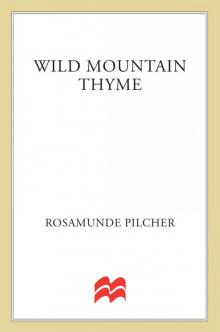 Wild Mountain Thyme
Wild Mountain Thyme Sleeping Tiger
Sleeping Tiger Flowers in the Rain & Other Stories
Flowers in the Rain & Other Stories September
September The Blue Bedroom: & Other Stories
The Blue Bedroom: & Other Stories The Carousel
The Carousel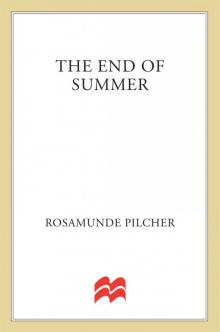 The End of Summer
The End of Summer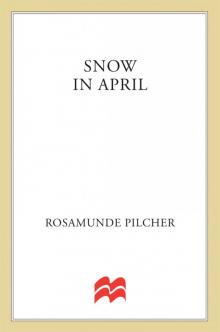 Snow in April
Snow in April The Shell Seekers
The Shell Seekers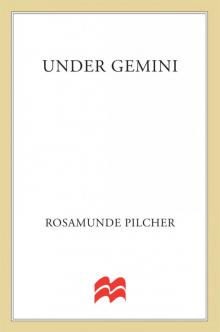 Under Gemini
Under Gemini The Empty House
The Empty House The Day of the Storm
The Day of the Storm Another View
Another View Voices in the Summer
Voices in the Summer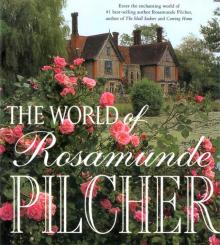 The World of Rosamunde Pilcher
The World of Rosamunde Pilcher Voices In Summer
Voices In Summer Blue Bedroom and Other Stories
Blue Bedroom and Other Stories